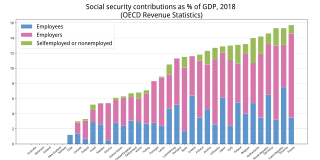
Insurance is a means of protection from financial loss in which, in exchange for a fee, a party agrees to compensate another party in the event of a certain loss, damage, or injury. It is a form of risk management, primarily used to protect against the risk of a contingent or uncertain loss.

Risk management is the identification, evaluation, and prioritization of risks followed by coordinated and economical application of resources to minimize, monitor, and control the probability or impact of unfortunate events or to maximize the realization of opportunities.

Medicare is a federal health insurance program in the United States for people age 65 or older and younger people with disabilities, including those with end stage renal disease and amyotrophic lateral sclerosis. It was begun in 1965 under the Social Security Administration (SSA) and is now administered by the Centers for Medicare and Medicaid Services (CMS).

Actuarial science is the discipline that applies mathematical and statistical methods to assess risk in insurance, pension, finance, investment and other industries and professions. More generally, actuaries apply rigorous mathematics to model matters of uncertainty and life expectancy.

Kaiser Permanente is an American integrated managed care consortium, based in Oakland, California, United States, founded in 1945 by industrialist Henry J. Kaiser and physician Sidney Garfield. Kaiser Permanente is made up of three distinct but interdependent groups of entities: the Kaiser Foundation Health Plan, Inc. (KFHP) and its regional operating subsidiaries; Kaiser Foundation Hospitals; and the regional Permanente Medical Groups. As of 2023, Kaiser Permanente operates in eight states and the District of Columbia, and is the largest managed care organization in the United States.
Health insurance or medical insurance is a type of insurance that covers the whole or a part of the risk of a person incurring medical expenses. As with other types of insurance, risk is shared among many individuals. By estimating the overall risk of health risk and health system expenses over the risk pool, an insurer can develop a routine finance structure, such as a monthly premium or payroll tax, to provide the money to pay for the health care benefits specified in the insurance agreement. The benefit is administered by a central organization, such as a government agency, private business, or not-for-profit entity.
Universal health care is a health care system in which all residents of a particular country or region are assured access to health care. It is generally organized around providing either all residents or only those who cannot afford on their own, with either health services or the means to acquire them, with the end goal of improving health outcomes.

Podiatry, or podiatric medicine and surgery, is a branch of medicine devoted to the study, diagnosis, and treatment of disorders of the foot, ankle and lower limb. The healthcare professional is known as a podiatrist. The US podiatric medical school curriculum includes lower extremity anatomy, general human anatomy, physiology, general medicine, physical assessment, biochemistry, neurobiology, pathophysiology, genetics and embryology, microbiology, histology, pharmacology, women's health, physical rehabilitation, sports medicine, research, ethics and jurisprudence, biomechanics, general principles of orthopedic surgery, plastic surgery, and foot and ankle surgery.
Single-payer healthcare is a type of universal healthcare in which the costs of essential healthcare for all residents are covered by a single public system.
The term managed care or managed healthcare is used in the United States to describe a group of activities intended to reduce the cost of providing health care and providing American health insurance while improving the quality of that care. It has become the predominant system of delivering and receiving American health care since its implementation in the early 1980s, and has been largely unaffected by the Affordable Care Act of 2010.
...intended to reduce unnecessary health care costs through a variety of mechanisms, including: economic incentives for physicians and patients to select less costly forms of care; programs for reviewing the medical necessity of specific services; increased beneficiary cost sharing; controls on inpatient admissions and lengths of stay; the establishment of cost-sharing incentives for outpatient surgery; selective contracting with health care providers; and the intensive management of high-cost health care cases. The programs may be provided in a variety of settings, such as Health Maintenance Organizations and Preferred Provider Organizations.

Social insurance is a form of social welfare that provides insurance against economic risks. The insurance may be provided publicly or through the subsidizing of private insurance. In contrast to other forms of social assistance, individuals' claims are partly dependent on their contributions, which can be considered insurance premiums to create a common fund out of which the individuals are then paid benefits in the future.
Geduldig v. Aiello, 417 U.S. 484 (1974), was an equal protection case in the United States in which the Supreme Court of the United States ruled on whether unfavorable treatment to pregnant women could count as sex discrimination. It held that the denial of insurance benefits for work loss resulting from a normal pregnancy did not violate the Fourteenth Amendment. The California insurance program at issue did not exclude workers from eligibility based on sex but excluded pregnancy from a list of compensable disabilities. The majority found that even though only women would be directly affected by the administrative decision, the classification of normal pregnancy as non-compensable was not a sex-based classification and so the court would defer to the state so long as it could provide a rational basis for its categorization.
The California Major Risk Medical Insurance Program (MRMIP) is a program of the Managed Risk Medical Insurance Board that provides health insurance for Californian citizens who are unable to obtain coverage in the individual health insurance market because of their pre-existing conditions. Californians qualifying for the program, participate in the cost of their coverage by paying premiums. The State of California supplements those premiums to cover the cost of care in MRMIP. Tobacco tax funds currently subsidize the MRMIP.

In California, the Employment Development Department (EDD) is a department of the state government that administers Unemployment Insurance (UI), Disability Insurance (DI), and Paid Family Leave (PFL) programs. The department also provides employment service programs and collects the state's labor market information and employment data. EDD is one of California's three major taxation agencies, alongside California Department of Tax and Fee Administration and the Franchise Tax Board. In addition to collecting unemployment insurance taxes, the department administers the reporting, collection, and enforcement of the state's personal income taxes.
In the United States, health insurance helps pay for medical expenses through privately purchased insurance, social insurance, or a social welfare program funded by the government. Synonyms for this usage include "health coverage", "health care coverage", and "health benefits". In a more technical sense, the term "health insurance" is used to describe any form of insurance providing protection against the costs of medical services. This usage includes both private insurance programs and social insurance programs such as Medicare, which pools resources and spreads the financial risk associated with major medical expenses across the entire population to protect everyone, as well as social welfare programs like Medicaid and the Children's Health Insurance Program, which both provide assistance to people who cannot afford health coverage.
Healthcare reform in the United States has a long history. Reforms have often been proposed but have rarely been accomplished. In 2010, landmark reform was passed through two federal statutes: the Patient Protection and Affordable Care Act (PPACA), signed March 23, 2010, and the Health Care and Education Reconciliation Act of 2010, which amended the PPACA and became law on March 30, 2010.
The California Contractors State License Board (CSLB) was established in 1929 as the Contractors License Bureau under the Department of Professional and Vocational Standards. Today it is part of the California Department of Consumer Affairs (DCA).
Healthcare in the United States is largely provided by private sector healthcare facilities, and paid for by a combination of public programs, private insurance, and out-of-pocket payments. The U.S. is the only developed country without a system of universal healthcare, and a significant proportion of its population lacks health insurance.
The California Healthy Families Program (HFP) was the California implementation of the federal Children's Health Insurance Program (CHIP) that provided low-cost insurance offering health, dental, and vision coverage to children without insurance that did not qualify for Medi-Cal.
This article summarizes healthcare in California.








